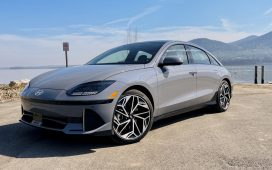On Monday, Ford fired its biggest round yet in the electric vehicle arms race by announcing it would transform 1,900 acres of farmland in rural Marshall, Michigan, into a $3.5 billion electric vehicle and battery factory. Spurred by the economic incentives of the Inflation Reduction Act, the new BlueOval Battery Park Michigan will not only crank out US-made batteries and EVs, but it will also develop new lithium iron phosphate (LFP) batteries expected to be more durable and faster charging than conventional ones.
A mere 90 miles away in Romulus, however, something else was happening: the plant that produces the electric F-150 Lightning had been sitting idle for about a week as engineers sought to solve an undisclosed battery issue. Ford officials later conceded the problem was a battery fire during a pre-delivery quality inspection that spread to another vehicle.
Ford issued more recalls in America than any other automaker
Both developments made headlines this week. That they came within 24 hours of one another says a lot about the current state of Ford.
On one hand, Ford ended 2022 as the number two seller of electric vehicles behind Tesla. The F-150 Lightning has already established Ford as the leader in electric pickup trucks, and demand for the Mustang Mach-E isn’t slowing down, either.
On the other hand, the automaker that once famously claimed “Quality is Job One” continues to struggle with problems on that front, particularly with new products. In 2022, Ford issued more recalls in America than any other automaker: 68 of them, affecting more than 8.7 million vehicles. That was up from 53 recalls affecting 5.4 million cars the year prior, according to federal data. In 2021, Ford set aside some $4 billion just for warranty costs, The Wall Street Journal reported last year.
Image: NHTSA
Owners have been left feeling frustrated over issues and repairs, especially to new, high-profile vehicles like the F-150 Lightning. Texas-based Lightning owner Justin Esquibel told The Verge his truck is a “$90,000 brick nobody knows how to fix,” suffering from issues almost immediately after he bought it in early December. He said he’s a member of a Lightning owner Facebook group where numerous people have complained of problems.
“It has been in the shop three times and now sits and waits for a wiring harness that’s on backorder,” Justin Esquibel said. “No ETA, and they don’t even know if it’s going to fix it.”
“A $90,000 brick nobody knows how to fix”
The situation became even more acute on Wednesday when it came out that Ford was also hitting pause inside a Louisville, Kentucky plant to solve a software issue affecting the updated Escape crossover, according to Automotive News. A plant manager told employees at the plant that if the car were to ship as such, it would need to be recalled and fixed later.
Following the battery fire, Ford officials said that Lightning production would stay paused while an investigation and repairs take place, which could take several weeks.
Ford spokesperson Maria Buczkowski said the issues this week with the Lightning and the Escape are separate, unrelated ones. She added that the Escape’s Louisville plant is still in the “pre-production” process, where defects and issues are often caught on early vehicles that aren’t intended for customers.
Even if the Escape’s issue was the kind of normal problem that could be caught by any automaker, the fact that it made headlines this week speaks to how many eyes are on Ford’s quality challenges.
Those are certainly no secret. The automaker has had four CEOs since the Great Recession, and essentially all of them have groused about profit losses due to warranty and recall costs on calls with investors. And when Ford closed out 2022 with a $2.2 billion loss, current CEO Jim Farley blamed some hits on investments in startups Rivian and Argo AI, but he didn’t mince words about what recalls and defects were costing the company.
Photo by Bill Pugliano / Getty Images
“In quality, we have work to do,” Farley said on an earnings call earlier this month. “Ford has been the number one in recalls in the US for the last two years. Clearly, that’s not acceptable.”
Ford’s quality issues have been blamed on a number of factors, including updating its lineup with multiple new vehicles at once for years to rapid, last-minute fixes when problems were caught.
No car company — no company period, really — wants to be known for quality problems or to deal with costly recalls. But Farley called Ford’s current moment a “double transformation”: improving its quality and bringing costs down, and becoming the kind of electric-focused, connected, tech-driven “mobility company” investors want car companies to be now. Doing both at once will be an expensive and difficult proposition.
“Ford has been the number one in recalls in the US for the last two years. Clearly, that’s not acceptable.”
“The issue right now, as Ford has pointed out, is that its future is costly, as are recalls,” said Jessica Caldwell, the executive director of insights at car-buying website Edmunds. “This is something the company wants to avoid as reduction of costs is more important than ever before. But nonetheless, it’s an expensive venture for Ford to simultaneously run [its traditional car business] and [its electric vehicle operation] so every penny must be strategically spent.”
For Ford’s part, Farley and other officials at the company say they’ve been working on the problem for a while and claim they’ve already put several quality-improvement processes into place.
Buczkowski added that a number of quality-related improvements are already in place at Ford and to get ahead of problems before they become costly recalls.
“Yes, there’s a lot of pressure on the company to move in this direction,” she said. “But I think every day there seems to be progress.”
Nearly every automaker has had teething issues with the types of cars that will define personal transportation in the future — ones driven by electricity and more defined by software than mechanical features.
Volkswagen’s new generation of EVs has struggled with software bugs. The groundbreaking Chevrolet Bolt has had repeated recalls for battery fires. Consumers across every brand continue to have frustrations with complicated controls, user interfaces, and automated driving assistance programs. Even Toyota, arguably the undisputed master of manufacturing quality, released an EV that had to be recalled because its wheels were literally falling off. In that way, Ford’s challenges aren’t unique.
But Ford’s issues started well before it kicked off its EV rollout.
“Ford, in particular, has run into its fair share of blunders with new vehicle launches in recent years,” said Robby DeGraff, an industry analyst at the marketing and consulting firm AutoPacific. “Products that are fiery hot and demanded, like the Bronco, or really important members of the lineup like the Explorer, for example, didn’t have the easiest roll-outs.”
Nearly every new Ford released in recent years faced costly recalls
Nearly every new Ford released in recent years faced costly recalls. The Bronco’s V6 engine was plagued with engine failures; the Explorer, all new for 2020, had scores of issues at launch; one recall last year for the Expedition and Lincoln Navigator asked owners to park away from buildings due to fire risk; and though Ford doesn’t even make the Focus or Fiesta for the North American market anymore, it’s still paying out claims for lawsuits over faulty transmissions made a decade ago.
Caldwell said that with massive recall campaigns in recent years like the Takata airbag scandal or General Motors’ ignition switch fiasco, consumers get so bombarded with vehicle announcements that they tune them out like “white noise.” Still, none of Ford’s quality issues help it convince consumers that it can pull off a shift to new technology like EVs.
She said that while many drivers have given Tesla leeway for its well-documented quality problems, that won’t last forever, and Ford won’t get the same treatment.
“That sentiment is fading fast,” Caldwell said. “Ford, with an established name and reputation for the invention of the automotive assembly line, will receive less latitude from its customers. This is why there is a lot of pressure on Ford to get it right the first time and deliver a good customer experience, which will set it apart from the emerging brands who will inevitably struggle to produce EVs at high volumes.”
Photo by Nilay Patel / The Verge
In theory, pivoting to EVs and software-defined vehicles could eventually mean positive news on the cost front for companies like Ford and its competitors. Those cars require far fewer parts to build and can have issues solved with over-the-air updates. Farley indicated as much on the investor call this month.
“These EVs will be fully software-updatable,” he said. “That means a brand-new electric architecture, and they’re going to be radically simplified. Imagine three body styles, each with a volume potential of up to 1 million units and just a handful of orderable combinations. That’s what we’re doing at Ford for the second generation of products.”
But getting to that point — and bringing costs down to where these new technologies can all scale profitably — will be a major near-term challenge for every automaker.
In theory, pivoting to EVs and software-defined vehicles could eventually mean positive news on the cost front for companies like Ford and its competitors
Ford officials say they’ve done a lot to take the quality issue seriously. Farley, who took the CEO job in 2020, last year appointed former J.D. Power executive and engineer Josh Halliburton to be its quality czar. Halliburton told the WSJ last year that Ford has started monitoring assembly lines via cameras to catch problems, is more actively watching social media to catch consumer complaints, and has acted to empower workers to more proactively say something if they notice problems.
Buczkowski said a number of other changes are in place that didn’t exist years ago. Those include communicating better with parts supplier companies, using the connected data from new cars to detect trends, and ramping up its mobile service and loaners for everything from oil changes to recalls.
DeGraff said he does think there’s a difference in how Ford operates now compared to previous eras. “I have superior trust and confidence that Ford is doing literally everything it can to fix the issue immediately,” he said. “Farley and his team have really demonstrated the kind of leadership needed to react to a crisis like this and take action.”
Still, with the EV competition heating up on every front and the billions needed to transform its business, one wonders what the story will be if 2023 ends with Farley yet again vowing to bring recall costs down.
Buczkowski said there’s an urgency at Ford to keep that outcome from happening.
“I think what is really getting across to people is that this is a priority in every part of the business right now,” she said. “We’re at a critical moment in time and it has to change. It’s what we talk about in every global town hall, every form of communication.”











